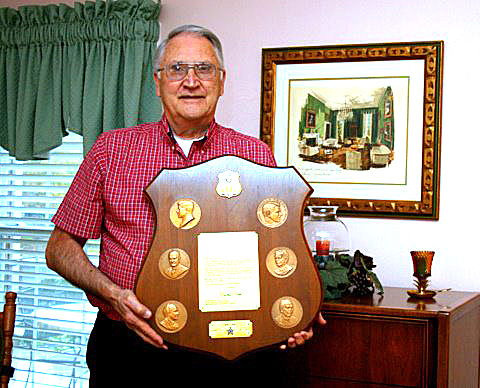
by Gene Marrano
From a childhood spent on a farm in rural Western Virginia to the halls of power in Washington, D.C., retired Secret Service agent Joe Dye had a story to tell. So he did, in a memoir originally intended for his grandchildren. When he showed it to friends they suggested that Dye, now retired and living in Roanoke, find a publisher. The result is “From Appalachia to the White House” (Crossbooks), detailing Dye’s life, which included a twenty-year stint with the Secret Service—in large part at the White House.
Dye rubbed shoulders with six U.S. presidents from Kennedy to Reagan, along with their vice presidents and assorted family members. He first came to the White House as a Washington D.C. police officer during the Cuban missile crisis in 1962 – during which time he was not able to go home for three weeks. “It was very tense,” recalls Dye, who was in his early twenties at the time. “I really didn’t grasp the seriousness of it until later.” Soon thereafter he was asked to transfer to the Secret Service.
He liked John Kennedy, observing him mostly from a distance, but thought his wife Jackie a bit cold. “She sort of just ignored us and went on her way,” he recalls. Young John Kennedy Jr. – “John John” – once asked him for gum, something his nurse did not approve of.
Dye had a much more somber task during the Kennedy White House years – standing guard in the East Room when JFK’s closed casket was brought back after the assassination in Dallas. Only family members were allowed in the room as agents worked twelve-hour shifts. One night the Catholic Bishop of D.C. – Kennedy was the first Catholic president – came in with Jacqueline Kennedy to perform posthumous last rites. Dye opened the casket for Mrs. Kennedy at her request.
Dye made some trips with the presidents he served, provided security at the White House and was often called to New York City when the president or a foreign dignitary would be speaking at the United Nations. “I made a lot of good friends in New York,” recalled Dye.
One of his fondest mementos is a plaque given to him by Ronald Reagan when he retired from the Secret Service during the Gipper’s first term in 1982. It features a personal letter from the president and medallions depicting the six Chief Executives he worked under.
Dye also recalls that Jimmy Carter would occasionally spend the night in Roanoke as the ex-president traveled on the I-81 corridor; in his post-Secret Service job as head of security for local Marriott properties, Dye made sure the agents traveling with Carter had comfortable rooms.
Dye became close to Carter’s Vice President, Walter Mondale, and his family. “We had a very close relationship,” said Dye, adding that he and his wife attended some Mondale family functions.
In fact Dye first began his public service career as a clerk for the FBI, where he met his wife Sue. Director J. Edgar Hoover often chatted with Dye and gave him advice about life. Sue worked at the switchboard outside of Hoover’s office. “I often say that J. Edgar was the one that got my wife and me together.”
Lyndon Johnson was “very dominant” and ruled with an iron fist at times. “I sort of had mixed feelings about him,” said Dye, who is still active working with seniors at his church today. “[Johnson] used some very colorful language, quite often to his staff. He was the main character.”
He liked Richard Nixon, writing about his photographic memory and a knack for remembering names. “I still think he’ll eventually go down as one of our greater presidents,” Dye adds. He didn’t hear the profanity others heard on the infamous Watergate tapes. “Around the White House [Nixon] was always very friendly – nothing like came out on those tapes.”
Ronald Reagan was “probably my favorite.” What people saw on television was what Dye saw at the White House. “He did not put on airs,” noted Dye. Reagan spoke to him and the other agents in the same manner – as a straight shooter. “He did not pretend,” said Dye.
“I find it fascinating that an old country boy can go from the Appalachian region of southwest Virginia [to] eventually working at the White House for 20 years, for six presidents” said Dye. Those who read the simple, sweet prose in “From Appalachia to the White House” can’t help but agree.
Joe Dye’s book “From Appalachia to the White House” is available at local booksellers, online and at crossbooks.com.


